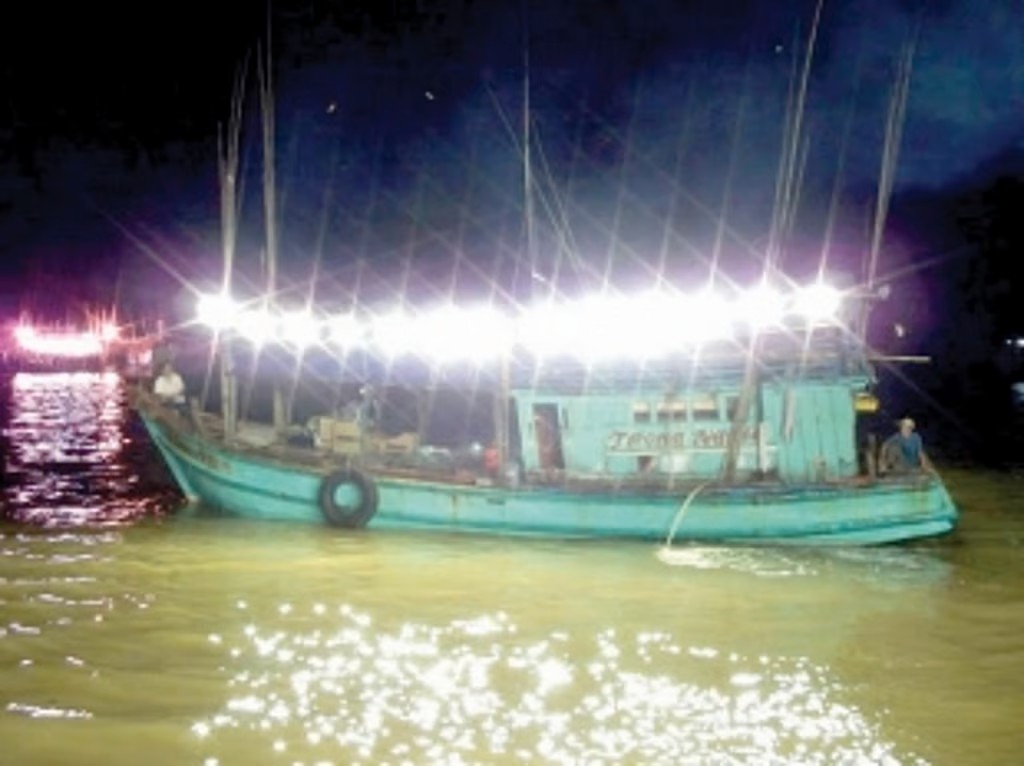A division bench of Justice M.S. Karnik and Justice Valmiki Menezes today released its detailed judgment on a batch of petitions relating to implementation of the ban on LED fishing in Goa state waters. The judgment was written for the bench by Justice Menezes.
The ban orders on bull trawling and LED fishing in both state and national waters had been issued by the state and central governments by separate memoranda in 2016 and 2017 respectively. However, these orders were being violated with impunity.
Principal reason for the ban was its association with unsustainable fishing practices, leading to serious decline in fish biodiversity and populations. Another serious impact was the effect on the catches of traditional beach seine netters, as the fish was drawn to the LED lights in the ocean instead of moving towards the shore. Smaller mechanized boats which did not use LED lights were also being thrown out of business due to the actions of the law breakers.
The crucial bone of contention raised by the petitioners was the illegal use of dedicated diesel generators on board the fishing vessels – without registration – which enabled them to indulge in the malpractice. However, LED ban violators were supported by the Department of Fisheries, which argued that the diesel gensets were required for a variety of uses on board these vessels.
Not being experts themselves, the judges commissioned a study by Goa Shipyard. The GS report categorically ruled that the diesel gensets were not required for any of the purposes associated with active fishing, boat’s motive power, or emergency. The report in fact was based on in inspection of several fishing vessels in which the report writers found considerable evidence of LED lamps and infrastructure.
The Court decided with petitioners on the connection between illegally installed gensets and LED fishing. However, it could not find any provision in law which would enable it to ban boats from carrying a diesel genset on board. To pre-empt any bypass of regulations, the Court however laid down stringent conditions for registration of vessels going out to sea, and asked for 3 monthly compliance reports to be placed before it.
Because of the whole inadequacy and unwillingness of the Fisheries Department to enforce its own ban, the Court has decided to place its faith in the Coast Guard, and has directed it instead to ensure the ban is implemented from the Goa coast upto 200 nautical miles. The Court wrote:
“The Director General of Coast Guard shall ensure regular patrolling of the sea, including by aerial reconnaissance, over the Maritime Zones off the coast of Goa, to ensure that no fishing vessel indulges in LED fishing or bull trawling and pair trawling within these Maritime Zones. All such measures, as it thinks fit, shall be used by the Director General, Coast Guard to enforce the ban on LED fishing and bull trawling and pair trawling under the Ban order 2016 and Ban order 2017. The Coastal Police and DOF shall ensure that full assistance is given to the Coast Guard to enforce this ban; the Coastal Police and DOF to ensure establishing a communication protocol with the Coast Guard for sharing of information with regard to the location of all fishing vessels setting sail from the jetties along the Coast of Goa, by sharing real time information through the Vessel Tracking System (VTS).”
The Court’s directions, which are at para 52 of the judgment, also require supportive actions from the Director of Fisheries and the Goa Coastal Police:
“The Director of Fisheries, and more particularly the Authorized Officer under the Marine Act shall take all necessary steps and measures, to ensure the ban on LED fishing, bull trawling and pair trawling under the Marine Act and the order of the Government of India dated 10.11.2017 (Ban order 2017) is enforced in letter and spirit; these authorities shall use all measures available under the Marine Act to enforce the ban. Where necessary, these authorities shall coordinate with and take assistance from the Goa Coastal Police Force and the Coast Guard to enforce the ban.”
“The Director of Fisheries and the Goa Coastal Police shall, on regular basis, carry out inspections of fishing vessels arriving at or departing from all six fishing jetties of the DOF in North and South Goa Districts and at any private jetties from where such vessels set sail or dock; these inspections shall be carried out, in particular to ascertain the equipment carried by these vessels which may be used for undertaking the banned operations under the Marine Act and Ban order 2017. The Director of Fisheries with the assistance of Goa Coastal Police, on inspection of these vessels, shall maintain a record of inspection and specify therein the details of the permits to operate these vessels and the compliance of all other statutory requirements under the MS Act and Inland Vessels Act, as the case may be. Where such vessels are not in compliance with the requirements of these statutes/rules/regulations, their registrations under the Merchant Shipping Act/Inland Vessels Act shall be immediately suspended/revoked, along with any permits/fishing pass that may have been issued to such vessels for conducting fishing operations or to set sail.”
The first compliance report is to be filed before the High Court by 2.09.2025.
The copy of the judgment can be downloaded here.
Claude Alvares/Goa Foundation

